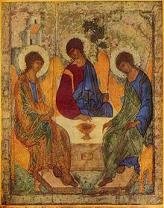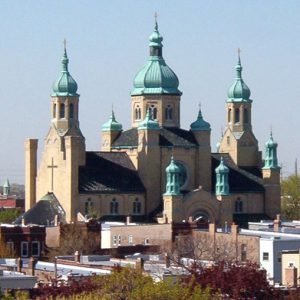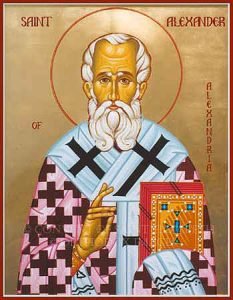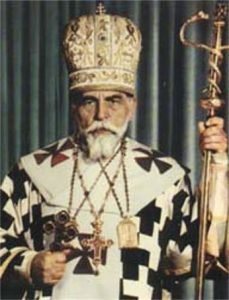
Lord, teach me to do Your will, for You are my God. (Ps. 143:10) Dear Sisters and Brothers in Christ! February 17th of this year marks the 125th anniversary of the birth of Patriarch Josyf Slipyj – Confessor of the faith and longtime Primate of our Church. The Synod of Bishops of the Ukrainian Greek Catholic Church has instructed all the faithful to honor his memory this entire year and to pray for his glorification here on earth among the choir of the blessed and the saints. The life of Patriarch Josyf has passed by in the whirlwind of the complex and dramatic events of the 20th century. He, like no other, endured almost all of the burdens and the sufferings of that historical period. His life lay against the backdrop of revolutions and two World Wars, the breakup of empires and the ever-changing state borders; he underwent imprisonment, exile and, finally, forced emigration… The Patriarch joined to himself the experiences of a hundred thousand or even of millions of Ukrainians, for whom these decades became the true via dolorosa per aspera ad astra (Way of the Cross through hardships to the stars). To be precise, this motto – “Through hardships to the stars” – Josyf Slipyj put on his episcopal coat of arms in 1939. His clandestine episcopal consecration took place under conditions when the Church was being persecuted during the Soviet occupation of Western Ukraine. Metropolitan Andrei Sheptytsky, confined by a serious illness to a wheelchair, tried to provide successive leadership for the Church and searched for an individual, “whom no trials could break”. The young bishop Josyf probably felt that his ministry would become a path through hardships. However, as the stars act as a guide for the sailor not to become lost on the stormy seas, so the light of Christ, that enlightens all, did become the guide for the future patriarch in his own life and in ministering to others. He came into this world, a subject of the AustroHungarian monarchy, and left it as an outcast of the last empire of the 20th century – the Soviet Empire. In his childhood, young Josyf dreamed of becoming a priest or a scholar. With the blessing and support of Vladyka Andrei Sheptytsky he was able to realize and join together these two great callings, even though external circumstances did not always contribute to their full realization. His years as a student coincided with the unrest of World War I and the desperate attempts of our people to gain independence and to unite into one state. Josyf Slipyj received his priestly ordination from the hands of Metropolitan Andrei in September of 1917 upon the Metropolitan’s return from Russian captivity. His higher theological studies were in Innsbruck, and then in Rome, amid the postwar devastation and the great socio-political and spiritual-moral crises in Europe of that time. In 1922, after completing his learning abroad, Father Josyf returned to a new political reality in his homeland. This time it was a restored Polish [Second] Republic, in which Ukrainians again found themselves in the role of a discriminated national and religious minority. This is why the Head of our Church entrusted to him the leadership of the Theological Seminary, the establishment of the Ukrainian Theological Scientific Society, and the development of the Greek Catholic Theological Academy in L’viv, which became the leading scientific and educational centers not only for Church circles, but even generally for the Ukrainian community of Halychyna (Galicia). And ahead lay an even greater test – the Second World War. The Ukrainian “bloodlands” collided with the center of contact of two totalitarian regimes – Hitler’s regime and Stalin’s regime, each “WE MUST BE OURSELVES!” of which was building his “new order” on the bones of millions of innocent victims and in denial of eternal Christian and universal values. In November 1944, after the return to Western Ukraine of the Bolshevik government and the passing into eternal life of Metropolitan Andrei, Vladyka Josyf took over the leadership of our Church. They describe that even a highly placed officer of the Soviet secret service, who was sent to L’viv in order to coordinate the violent liquidation of the Ukrainian Greek Catholic Church and, having seen the young bishop in bishop’s vestments during the [metropolitan’s] funeral procession, whether with regret or “with knowledge of the matter”, noted: “How many crosses have they placed on that bishop! How is he supposed to bear them all?” But in the night of April 11th, 1945 the new Primate of the Ukrainian Greek Catholic Church, together with other bishops and wellknown priests, was arrested. He served the next 18 years behind the walls of the repressive Soviet penal system, at the same time he tirelessly and relentlessly carried his cross as a confessor of the faith and confirmed others in hope. His deep faith in God, faith in that the Lord’s Providence should defend the Church, which the Lord Himself established and that no one could destroy, were for him spiritual supports and guides in order not to lose himself in the midst of the prickly thorns of his terrible trials. Having received his release in 1963, thanks to the efforts of Saint Pope John XXIII and U.S. President John Kennedy, and, having arrived in Rome, Metropolitan Josyf never renounced his Ukrainian (though Soviet) citizenship. Even so, the “deported without right of return” archpastor wanted to be together with his suffering people, at least to show solidarity with his faithful who remained in the house of bondage. While in the West, he made great efforts in order to find and gather together those who, either by material need or political circumstances in the homeland, had been scattered throughout the world. The Patriarch and Confessor of the faith understood that without solid spiritual and intellectual foundations a people will be doomed to forget their roots, to disorganization and self-abasement, to utter subjugation and assimilation. Consequently, Vladyka Josyf Slipyj issues his first decrees “in the free world” with respect to the establishment and expansion of two institutions: the Ukrainian Catholic University and the Cathedral of St. Sophia. Notwithstanding his advanced age, and not lamenting about his energy and health having been broken by years of imprisonment, he visited each eparchy and every exarchate in the diaspora; he travelled to almost every parish, collecting not only funds but even rallying all “who were scattered” into one nation fullof-itsown-dignity under God in his Particular Church. Patriarch Josyf Cardinal Slipyj did not live to see by only a few years the collapse of the Soviet Union and its utter demise. He reposed in the Lord on September 7, 1984 and only in August 1992 his mortal remains “returned” in a stately and solemn manner from Rome to L’viv, after the Ukrainian people had gained their state’s independence and after the persecuted Church came out of the catacombs. But a true respite for his sleepless soul our great patriarch bequeathed only then when “if it be God’s will and the desire of the Ukrainian people, [they] place my coffin in the catacombs of the renewed Sobor of St. Sophia” in Kyiv as a sign of unity and sobornist’ of our entire nation and her unified Kyivan Church. We should all work on this task a great deal in order to fulfill the last will of this exemplary man of the Church! Meditating on the pages of the biography of Patriarch Josyf, we may assume that in his youth, dreaming about his future, he wasn’t even thinking that he would have to experience so many difficult times and trials. But, as we know from his memoirs, he always asked himself this question: “What does Lord expect from me?” And he often pondered on the question: “What will history say about me one day, with which I will stand before the Lord at the awesome tribunal of Christ?” It is understood that Josyf Slipyj became a great person not at any one moment. From day to day he grew in prayer, holiness, wisdom, in the sense of responsibility, and most of all – in fidelity to God’s will. His life, as the life of every one of us, was not a straight path, but rather a labyrinth, in which every choice is important. Because at every turn, it is possible to make an error, choosing not that particular path. In order not to be lost on this path, we need an inner compass that will suggest the correct path for us. The Servant of God Josyf did not search for guides in transient ideas or false hopes. In his pastoral letter “On the Unity in Christ” (June 3, 1976) he addressed his flock using direct advice: “We must be ourselves!” This “being ourselves” is being born in every one of us in the moment when in our prayer to our heavenly Father we recognize His will with reference to our life. And every stage in Patriarch Josyf’s biography is marked with this sign of authenticity, at the center of which Christ abides. He was himself, when he revealed in himself the attraction to learning and devoted his entire life to it, not so by his own academic work, but by creating the conditions and institutions for others. He was himself, when he felt his calling to the priesthood and devoted his whole self to this calling, in spite of the restrictions and the bans to exercise his ministry. He was himself, when he rejected the promised freedom and high positions if he were to renounce his Church. He was himself, when he, having found himself in the West, became the voice and symbol of the “silent Church” in the USSR and all the persecuted by the godless, totalitarian government. He was himself, when he continued to defend the right of the religious community, of which he was the head, to patriarchal dignity. Only this position gave him the opportunity not to be dependent from the stunning changes around him and to worthily move through all these turning points of history. Today, when we often hear that we live “in fluid times” or even “in the post-truth era”, when everything around is forever changing, nothing is firm and hopeful, truth does not exist, there are only “points of view”, that one is right whoever has power and money, and that one can become popular by means of cheap slogans and promises, — Patriarch Josyf’s invitation to authenticity, to “be yourself”, is once again extremely important. To be ourselves was never easy; it is even more difficult to exercise our calling in the uncertain times we are now experiencing. At first glance, it is much easier and more comfortable to adapt to change, to fit ourselves to external conditions, to refuse to recognize absolute Truth… But, woe to the person who ceases to be himself or herself, who loses himself or herself. The life of Patriarch Josyf, the raising-up of our Church from the catacombs and her further dynamic development bear witness that only the one overcomes the volatility and the fluidity of history, who invariably remains in his or her core the same as the Lord created him or her. This path, even though difficult and full of thorns, is possible, and it brings a person great inner satisfaction and joy because he or she exercises his or her Christian duty and does God’s will, and only in this way can he be himself or can she be herself. Therefore, in this Jubilee Year of our Patriarch Josyf, we encourage all to think about who we are and what our task is on this earthly pilgrimage to eternity, in our journey today “through hardships to the stars”. And may the Lord Jesus Christ Himself, Who alone is the Way, the Truth and the Life, be for us that leading star that will allow us to overcome all obstacles on this path of “WE MUST BE OURSELVES!” (continued from previous page) truly knowing our very selves through His Cross and Resurrection. The life and fate of Patriarch Josyf persuade us that, with deep faith and God’s help, a person of unbreakable will, who does not renounce his or her Godgiven being, who does not give up on his or her calling and who exercises his or her ministry, will overcome, whatever the circumstances, in a duel with evil and falsehood. The blessing of the Lord be upon you with His grace and love for mankind, always, now and for ever and ever.
+ SVIATOSLAV
Given in Kyiv at the Patriarchal Cathedral of the Resurrection of Christ, on the Feast of the Encounter of Our Lord Jesus Christ, 15 February 2017 A.D.
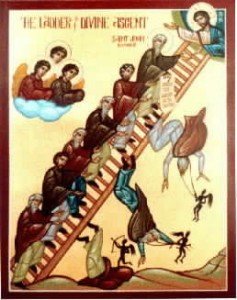 The very last step on John’s LADDER is FAITH, HOPE AND LOVE. John writes, And now at last, after all that has been said, there remains that triad, faith, hope and love, binding and securing the union of all. “But the greatest of these is love”, since that is the very name of God Himself. To me they appear, one as a ray, one as light and one as a disk,” and all as a single radiance and a single splendor.
The very last step on John’s LADDER is FAITH, HOPE AND LOVE. John writes, And now at last, after all that has been said, there remains that triad, faith, hope and love, binding and securing the union of all. “But the greatest of these is love”, since that is the very name of God Himself. To me they appear, one as a ray, one as light and one as a disk,” and all as a single radiance and a single splendor.
